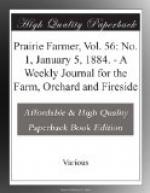The successful raisers of many kinds of flowers use, more or less, some kind of what might be called artificial stimulants other than the ordinary manuring of the soil at the time the plant is set out, whether it be in pot culture or in the open benches. This is no new thing under the sun; not a few who have been in the habit, and found great results, have tried to keep a monopoly, and have been more or less close-mouthed in the matter. Perhaps one of the oldest forms of this feeding extra stimulants to their pets was in the form of liquid manure made from various materials, as horse, sheep, cow, and other manures. They are sometimes prepared with ever so much mystery in the matter of quantity, time of preparation, quantity given, etc., all of which was supposed to have its influence. Of one thing, however, there was certain, tangible evidence that many of these persons managed, if for exhibition, to carry off the best premiums; and if for the market were pretty sure to command the best prices, and what is more, obtain the greater results financially.
Soot, guano, ammonia, and in later years, material obtained from the immense slaughter-houses, such as blood and other offal in a highly concentrated form, find, perhaps, nowadays, more advocates; principally because the first-mentioned list contains articles that give off very offensive odors while being applied, so that the more fastidious are loath to use them. What may not be very offensive to the plodding florist would be highly so to the more refined, or when the general public comes more into contact with the crops while being so applied. In almost all of the cases where the ingredients mentioned are used they are diluted with a large quantity of water, except in the case of the droppings of the animals; the latter are often used by florists in the form of a very heavy mulch, depending upon the ordinary watering to carry down to the roots such parts of the dressing as would dissolve in the water, and thus give extra stimulant, and at a time when it would do the most good, because, ordinarily, the more water necessary the greater the growth going on, and vice versa, if plants are in a state of rest, either from a finished growth or from lowness of temperature, but little water would be needed, and but little benefit from the mulch, except such as undoubtedly arises from the ammonia itself in the manure permeating the atmosphere, which again, however, would be the most active when heavy watering was necessary, simply because of the high and humid temperature.
For obvious reasons the votaries of window gardening will use those giving off little or no unpleasant odors. Others again make the soil so rich in the first instance that much less of what may be called artificial manures are required during growth. But without some skill in this matter it is not safe, for if much of the material is not thoroughly decayed (which, however, has then lost most of its volatile




